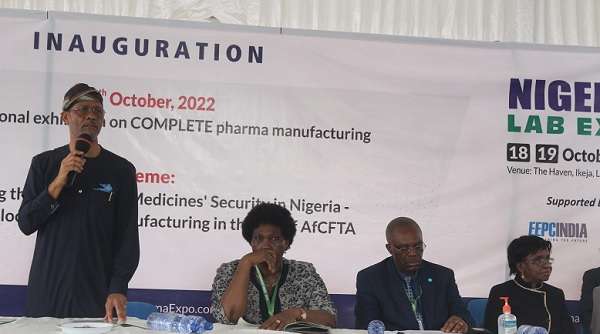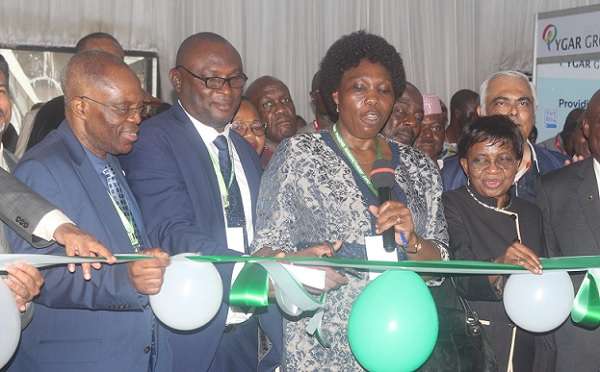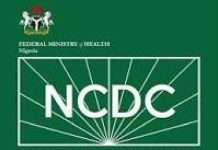–As stakeholders list benefits of Pharma Manufacturers’ Expo

For Nigeria to attain self-sufficiency in local drug manufacturing and an enviable rating in terms of universal health coverage and medicine security, especially in an era when global health emergencies are springing up unannounced, policy makers must continue to chart innovative courses capable of changing the old narrative in Nigeria. This and more were the submissions of the Lagos State Commissioner for Health, Professor Akin Abayomi, who was the Chief Host of the 6th Nigeria Pharma Manufacturers’ Expo, taking place at the Haven, Ikeja GRA, Lagos between 18 to 19 October, 2022.
Welcoming participants to the event, Abayomi posited that government, as a policy maker, needs to define policies that lead to cutting-edge regulation and quality control practices that do not threaten citizens’ security and that of the state. He also urged government to create the enabling environment for the private sector to flourish while harping on the urgency of capacity transfer not only in the manufacturing sector but in the research and development (R&D) segment.
Speaking on efforts being put in place for local vaccine manufacturing to begin in Nigeria, Abayomi observed that the role of government remains pivotal in that regard, adding that vaccine manufacturing requires the right economic environment and biotechnological stimulation. For him, the 6th Nigeria Pharma Manufacturers’ Expo which pushes towards the indigenisation of local manufacturing is replete with growth and expansion opportunities within the Nigerian pharmaceutical landscape. He highlighted the indigenization agenda of the Lagos State Government through activities going on in the herbal/complementary/alternative medicine industry in the state under the purview of the Lagos State Traditional Medicine Board (LSTMB) as one of those efforts capable of stimulating the growth of the local manufacturing industry for the ultimate goal of attaining medicine security.

On his part, chairman of PMG-MAN, Dr Fidelis Ayebae, while commending the role regulatory bodies like NAFDAC have been playing so far in stimulating the local manufacturing sector for optimal performance, urged all policy makers to work more towards protecting the Nigerian pharmaceutical industry with stiff regulation and policies that would place it in a position of advantage rather than weakness. He added that unless Nigerian policy makers protect the local manufacturing industry, the African Continental Free Trade Area, when fully operational, would only open Nigeria up for all sorts of imports that would eventually degrade the potentials of local manufacturers.
Harping on the achievements of her office in the area of strengthening the local pharmaceutical industry, DG of NAFDAC, Professor Mojisola Adeyeye, called for more government involvement in health-related projects and innovations. She asked the Nigerian government to take a cue from India whose Ministry of Trade and Industry recently met with pharmaceutical manufacturers in the Asian country. Highlighting one of the highpoints of her administration, Adeyeye said: “Our 5+5 policy aims at boosting the local manufacturing industry. The policy has yielded fruits as we now have 34 registered products from the 9 we had prior to this time. NAFDAC will not allow the local manufacturing industry to die. Having attained Maturity Level 3, we are aiming towards Level 4.”
On NAFDAC’s service-oriented philosophy, she added: “We are placing more premium on the health of Nigerians and not on profit. Local vaccine manufacturing will happen faster than we think. We are preparing for it. Some NAFDAC staff are right now on their way to South Korea for bio-manufacturing training. We now have more international partners collaborating with our local manufacturing industry.
Corroborating Adeyeye on the need for governments to get involved in efforts aimed at strengthening the health outcomes in African countries, especially Nigeria with its exploding population, Keynote Speaker and WHO Country Representative, Dr Walter Mulombo, said that medicine security remains the real essence of the global health security agenda. He commended the Nigerian government for some of the proactive steps it is taking in ensuring medicine security for its citizens. “Working with the Nigerian Health Minister and NAFDAC in putting in place those requirements that would lead the country to attaining universal health coverage shows that Nigeria is truly and practically on course,” he said. On how and when Nigeria would start its local vaccine manufacturing, he added: “We need to accelerate the pace of our local manufacturing. There must be a paradigm shift. Nigeria has the potential to change the narrative in Africa, thanks to its innovativeness and capacity to boost local manufacturing.”
For the President of the Pharmaceutical Society of Nigeria, Professor Cyril Usifoh, government needs to do more by tackling the forex and import duty crises that have made it extremely difficult for local manufacturers to do business in Nigeria. He said: “With no forex to import APIs and the high cost of import duties on pharmaceutical raw materials, government needs to change policy to help local manufacturers fulfil the promise of medicine security to the citizens. We need this help urgently to be able to compete globally.”
Bemoaning the precarious situation in the disposable syringes manufacturing segment in Nigeria, Chairman of the Pharmacy Council of Nigeria (PCN), Professor Ahmed Tijani Mora, called on PMG-MAN and other stakeholders to do something about the not-too-encouraging reality.
Warning that more dangers await the Nigerian health space, if stakeholders fail to build capacity in the local drug manufacturing industry, DG of the National Institute for Pharmaceutical Research and Development (NIPRD), Dr Obi Adigwe, observed that PMG-MAN has always played very significant roles in the Nigerian health sector. He recalled that the body had warned of impending health crises prior to the emergence of the coronavirus pandemic. He commended NIPRD for securing funds towards boosting local manufacturing in the country.
The 6th Nigeria Pharma Manufacturer’s Expo with the theme: “Advancing the Frontiers of Medicine Security in Nigeria, Expanding Local Manufacturing in the era of AfCFTA,” brings together over 80 exhibitors from within and outside Nigeria for serious business networking and ventilation of ideas. The opening ceremony witnessed the presence of decision makers and other stakeholders in the Nigerian pharmaceutical industry, including Sir Ifeanyi Atueyi, managing director, Pharmanews Ltd; who was openly recognised for his invaluable contributions to pharmaceutical journalism sector.
Speaking on the benefits of the expo, Professor of Pharmaceutical Chemistry and CEO of Bloom Public Health, Chimezie Anyakora, whose company has been in the forefront of championing innovative interventions in the Nigerian health space, said: “I think this expo will be a good boost to the pharmaceutical sector in Nigeria. The keynote speaker made a clear point which I align with. The pharmaceutical sector in Nigeria needs to embrace the path of WHO Prequalification. This is the only pathway to move the country to the next level. The DG NIPRD also alluded to the big thing coming. NIPRD and Bloom are partnering in a World Bank-funded project to provide the biggest intervention in the sector. I urge the industry to embrace this. The size of the pharma sector is so big to continue to play at the level Nigeria is playing. The AFCTA makes it even more urgent.”










